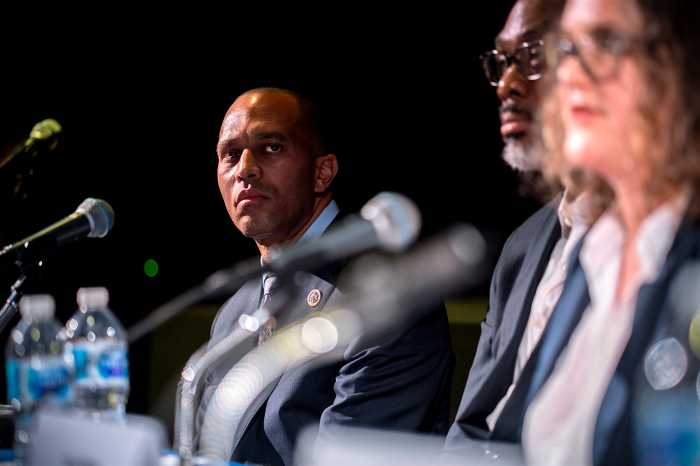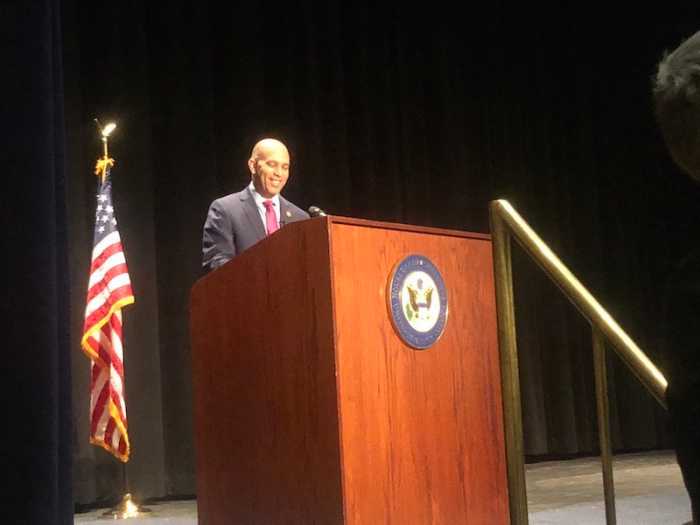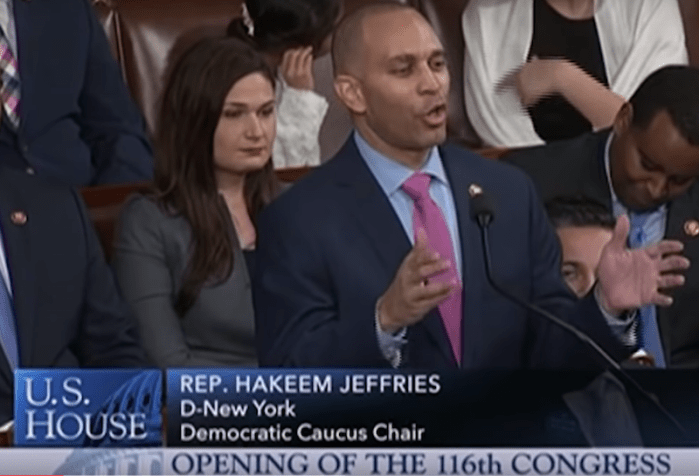U.S. Rep. Hakeem Jeffries (D-Fort Greene, Clinton Hill, Bed-Stuy, Brownsville, East New York, Canarsie, Mill Basin, Coney Island, parts of Queens) has scored a major legislative win in Congress after President Trump on Friday signed his criminal justice reform bill into law.
Jeffries and Republican Congressman Doug Collins (R-GA) crafted the legislation in a bipartisan effort earlier this year, S.756, and dubbed the Formerly Incarcerated Reenter Society Transformed, Safely Transitioning Every Person Act (FIRST STEP).
The measure overwhelmingly passed the House in May, the Senate, 87-12, earlier this month and then the revised bill went back to the House where it passed again, 358-36.

“The FIRST STEP Act is a victory for all Americans who believe in justice and the power of redemption. This bill will transform lives by providing access to the mental health counseling, education, job training and substance abuse treatment needed to help incarcerated individuals get back on their feet and become productive members of society,” said Jeffries.
“It also provides retroactive relief for the shameful crack cocaine sentencing disparity that unfairly destroyed lives, families and communities. The FIRST STEP Act is not the end. It’s not even the beginning of the end. It’s simply the end of the beginning of a bipartisan journey to eradicate the mass incarceration epidemic in America.”
The legislation will propel formerly incarcerated individuals toward success when they return home, while enacting targeted reforms that would improve public safety and reduce recidivism. It authorizes $375 million over five years to develop new programs, including education, vocational training and mental health counseling. Consequently, newly-released individuals will be positioned to successfully re-enter society.
With respect to sentencing reform, the FIRST STEP Act will increase public safety and engineer much-needed changes to draconian sentencing laws connected to the failed war on drugs. It modifies the three strikes law to make it more humane, increases judicial discretion to reduce sentences for low-level nonviolent drug offenders and provides retroactive relief for thousands unjustly sentenced during the crack-cocaine era.
Highlights of the bill include:
Address Crack Cocaine Sentencing Disparity: Before 2010, those convicted for crack cocaine-related issues received a sentence 100 times harsher than that of those convicted of cocaine-related offenses. The Fair Sentencing Act of 2010 reduced that disparity to 18-1. FIRST STEP makes that change retroactive, thereby reducing the sentences of thousands of individuals serving unduly heavy sentences.
Curtails Juvenile Solitary Confinement: No young person should be kept in solitary confinement, which can cause substantial psychological damage. This provision severely limits the use of juvenile solitary confinement.
Focus on Dignity for Women: Being pregnant while incarcerated can be a harrowing experience. There are far too few guarantees for the health and safety of both mother and baby. Egregiously, there is no federal ban on shackling pregnant and post-partum women. This bill implements such a ban starting from the moment that a woman is confirmed to be pregnant and extending three months beyond her pregnancy. In addition, the bill requires that BOP provide sanitary napkins and tampons to incarcerated women for free.
Requirement to Move People Closer to Home: The journey to visit loved ones in prison can be extremely burdensome and cost-prohibitive for families. However, contact with family reduces recidivism. That’s why the bill mandates that prisoners shall be placed within 500 driving miles of their families.
Reduce Mandatory Minimums: The bill reduces second strike mandatory minimums of 20 years to 15 years, and reduces the third strike mandatory minimum of life in prison to 25 years. It also solves the 924(c) “stacking” problem by prohibiting the application of recidivist mandatory minimum enhancements for repeat offenders who commit certain firearms offenses to conduct within the same indictment.
Good Time Credit Fix: A provision which will ensure that incarcerated individuals can earn the 54 days of good time credit per year that Congress intended, and not just the 47 days that the Bureau of Prisons (BOP) currently allows. This retroactively applies to all prisoners who have earned credit for good behavior. It has been estimated by BOP and GAO that fixing this will lead to the release of roughly 4,000 prisoners and save $40 million in the first fiscal year.
Compassionate Release: The current prison population is aging, causing significant challenges. This bill expands the compassionate release program from the Second Chance Act. It expedites BOP consideration of petitions, providing family members the opportunity to visit terminally ill offenders and ensures assistance with submissions of petitions for compassionate release.
The Establishment of a Risk-Reduction System: This system, which is already used at the state level to best match inmates to programs fitting their needs, must be based on dynamic factors to best lower someone’s risk of recidivating over time. The bill mandates that the system must be statistically validated and must be evaluated to ensure that it does not result in unwanted racial disparities in order to address concerns about prisoners of color being disproportionately impacted.
Focused Resources on High and Medium Risk Prisoners: Evidence shows that this kind of programming has the greatest impact on those prisoners who are at the greatest risk of recidivating. To make the bill as effective as possible, it gives priority to high and medium risk inmates. People will be able to participate in such programming throughout their sentence.
Add Safety Valve: Low-level drug offenders who cooperate with the government should not have to face the certainty of decades in prison. Under the bill, judges will have more discretion to sentence below the mandatory minimum for qualified nonviolent offenders.
Requirement for Provisions of IDs: When transitioning back into society, many formerly incarcerated individuals find themselves without proper identification necessary to access essential services like housing, or to apply for employment. Assisting formerly incarcerated individuals with obtaining ID prior to release will reduce the collateral consequences of incarceration by allowing a quicker integration back into society, as well as create significant cost savings for BOP of approximately $19 million.
The FIRST STEP Act enjoys the support of more than 70 organizations, including the Equal Justice Initiative, National Urban League, Families Against Mandatory Minimums, Gathering for Justice/Justice League NYC, the Charles Koch Foundation, #cut50, Public Defender Association and the CAN-DO Foundation.










